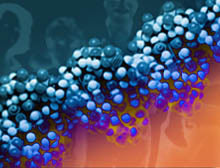Avi Blizovsky

Direct link to this page: https://www.hayadan.org.il/genzihum.html
Soot particles can cause genetic damage that will be inherited, Canadian researchers reported in a study in mice.
More studies are still needed to learn whether people can inherit DNA damage that harms their health. Meanwhile, the discovery certainly increases scientists' concern about particulate matter, those soot particles emitted from factories, power plants and diesel-powered vehicles.
The good news is that the air filters protected the mice from the problem.
"The new study now adds another potential area of concern, because of the complications that arise from risks to future generations," said Dr. Jonathan Smet of Johns Hopkins University, who spearheaded a call by the National Academy of Sciences for more studies on the danger from this common air pollutant.
These particles are known to cause a long list of health problems, including asthma and heart disease, in people who breathe high levels of them.
However, there was little evidence that any air pollutant could cause genetic damage that is passed on by inheritance - until Canadian researchers in 2002 housed mice near a metal factory and tested their hypothesis. The males carried twice as many mutations as mice that lived in a cleaner rural area.
The question was why
The question was why.
The same researchers, from McMaster University in Ontario, reported in Tuesday's edition of the journal Science that they had found the cause: burnt particles, known as soot.
In the new study, biologist James Quinn and his colleagues housed two groups of mice near the steel mill for ten weeks. One group breathed the air outside, while the other group was housed inside a room equipped with high-efficiency filters designed to trap microscopic particles (HEPA).
After that, the female mice were fertilized with the sperm of the males from the same group (respectively) and their offspring were tested for genetic mutations transmitted through the father's sperm.
In the mice that breathed the polluted air, the rate of genetic mutations was 52% lower than in the mice that were exposed to air pollution.
The specific change in the sperm was measured and no connection to diseases was found, but the damages are similar to a type of DNA damage. According to Quinn, further research is needed to see if this seed contains markers for potential health problems, and whether mutations resulting from infection in disease-causing genes can also be inherited.
Quinn says the value of the study may be in showing the effectiveness of air filters. The filters block particles, nature does the same - the particles stick to the leaves of the trees, a fact that has implications for decision makers about cutting down trees to allow the construction of buildings and roads, he said.
The Environmental Protection Agency has already ordered the tightening of standards regarding the permitted amounts of pollutant particles in the air because of the concern about the effects on sensitive populations, such as children, the elderly and people with respiratory diseases. In December, it plans to reveal which parts of the country do not meet standards.
Because they are too small to be breathed into the lungs, these particles enter the bloodstream and travel throughout the body.
At this point we are faced with the problem that although the visible air is clean, it still has harmful effects from the particles. says Hopkins Summitt.
"If those particles cause damage that is inherited through the sperm cells, it will be an impressive sequence", one that needs confirmation. In any case, the potential for damage to future generations makes the issue public, as well as the concern for preserving the ecosystem. said.
For news on CNN
Environmentalist - Earth
https://www.hayadan.org.il/BuildaGate4/general2/data_card.php?Cat=~~~848582997~~~272&SiteName=hayadan
